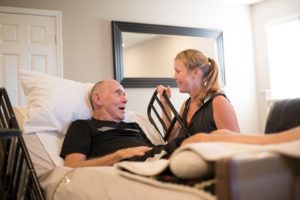
An Iowa nursing home abuse attorney gets many questions about what constitutes nursing home abuse. For instance, if you have visited a nursing home in Iowa, you may have seen some of the residents being restrained. Not all restraints used in a nursing home constitute abuse but some do. In addition, restraints are not limited to tying someone down. Rather, restraints in a nursing home setting are defined as all types of equipment and methods used to restrict movement.
Physical Restraints Used In Nursing Homes
The most common types of restraints used are physical restraints and chemical restraints. This post will primarily discuss physical restraints and how they apply to Iowa nursing home abuse cases. If you believe your loved one is being restrained by the use of medication (also known as chemical restraint), you can learn more in this blog post.
The types of physical restraints used vary between nursing homes, but can include:
- Arm and leg restraints
- Bedrails
- Wheelchair bars and brakes
- Vests
- Tucking in bedsheets tightly so the patient is “trapped” by the sheets
- Use of recliners or other chairs that prevent your loved one from getting up
In an attempt to seem more kind towards residents, some nursing homes in Iowa have labelled themselves “restraint free.” Be wary of this title. Nursing homes with Medicare and Medicaid residents must meet all of the requirements of federal law. These requirements include the physical needs of a resident. Sometimes those physical needs of a resident can include the use of restraints.
It’s up to the resident’s doctor to order the use of restraints, but if they are needed, they must be ordered. That is why no federally funded nursing home can actually be “restraint-free.” The medical order must also tell the nursing home what type of restraint to use and for how long. If you are concerned about the use of restraints on your loved one, speak with the doctor. Make sure they address all the concerns you have.
Appropriate Use of Physical Restraints in Nursing Homes
Restraints should always be a safety device of final resort, but sometimes they are the only option to prevent harm. If a resident is a danger to themselves or to others, restraints can be used to maintain safety.
Proper use of restraints can include:
- Emergency situations where a resident is hurting others or themselves
- To prevent the resident from pulling out IVs or other lines that are necessary for their health
- Keep someone in a proper position after a medical procedure
In these situations, the person should be monitored closely and removed from the restraints if there is any discomfort or other issues.
Improper Use of Physical Restraints in Nursing Homes
This does not mean the use of restraints is always appropriate. As discussed before, the act of restraining someone should only be used after other methods have been tried and not been effective. At no time is it suitable to use restraints in the following ways:
- As punishment or discipline
- To maintain order
- To make patient care easier / for staff convenience
Every resident has rights. If caregivers are using restraints on your loved one in an improper way, it could be a violation of those rights. You should speak with the nursing home administrator about your concerns. Do not be afraid to advocate for your loved one’s rights. If you believe your loved one is being restrained improperly and you are dissatisfied with the responsiveness of the nursing home, don’t hesitate to speak to an experienced Iowa nursing home abuse attorney.
If you have more questions, download our FREE Law Guide to Nursing Home Abuse Claims or call us at 1-319-774-1542 to speak with one of our nursing home abuse lawyers.




